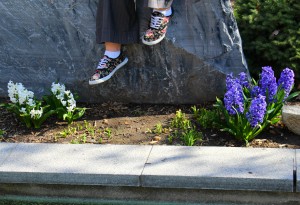
Many college students spend their summers lounging at the beach in flip flops, walking around foreign cities sporting trendy sandals or wearing thin flats at concerts. However, students may not realize their shoe choices can negatively impact their overall health both now and in the future.
An academic study found that 24 percent of adults report having foot ailments, and many of which were cured or aided by wearing supportive footwear.
According to the study, “emerging evidence suggests that orthotics, specific shoe types and footwear interventions may provide an effective, non-surgical intervention in rheumatic diseases.” Many people, including students, are increasingly heeding the pain in their feet and advice of doctors by turning to more supportive shoes during the summer.
Students who don’t experience foot pain in college may not realize the problems their shoes may be causing. Dr. Raymond Wright, a chiropractor in Virginia, said it can take years to develop foot problems stemming from poor footwear.
“As people get older, certain conditions start to manifest themselves and they become much more difficult to treat. Prevention is always best,” Wright said.
Wright has seen multiple athletes with plantar fasciitis (pain and inflammation of foot tissue) caused by wearing shoes with little to no support. He cautioned against students wearing unsupportive shoes on a regular basis.

“If you don’t wear shoes that have proper arch support, the arches of the foot can fall over time,” Wright said. “Years of wearing shoes without support can weaken the tendons that run along the inside of your ankle that help support the arch.”
Tendons and ligaments can weaken because of poor arch support in shoes, according to Wright. This can lead to pain in feet, ankles and knees. He said this chain reaction causes weak posture and leads to pain in the spine and hips.
Students should make conscious decisions about the shoes they wear. Deb Hutchins, a BYU senior majoring in food science, said she generally tries to choose supportive shoes because she doesn’t want to have adverse health effects from poor footwear.
“Without support in shoes, it can mess up one’s alignment. From the feet, the knees get messed up, the hips get messed up, the back, the neck and so on,” Hutchins said. “I have had extended family need surgery on different parts of their bodies all stemming from flat feet and the lack of support in shoes.”
Sophomore Michael Carter said he generally wears Sperry brand boat shoes during the summer for style and because he likes to be barefoot as often as possible. He only wears low cut shoes after a bad experience he had wearing high-top shoes as a teenager.
“Wearing high-top basketball shoes led to me having weak ankles because the shoes did all of the supporting for me,” Carter said. “Because of that, I often rolled or sprained my ankles when wearing lower-cut shoes. Now, I only wear low-cut shoes to make sure that my ankles stay strong.”
Students should take the time to find the shoe that is best for their unique foot, according to Dr. Doug Doxey, a podiatrist from Nevada. He said many patients come in to see him for foot pain during the transition period between seasons.
“Often the patient may be wearing a supportive shoe (during the winter), and as soon as the weather gets warm they quickly go to a flip-flop for an eight-hour day on their feet,” Doxey said. “The result is often some type of injury.”
He emphasized the importance of students finding shoes that support and fit their individual foot size and shape. According to Doxey, some people may “tolerate a flip-flop or another shoe while others cannot walk a block in them.”
Doxey said there’s no one brand or style that works for everyone, but he often recommends Altra, Asics and Brooks shoes to patients. He personally prefers wearing Chaco brand hiking sandals and running shoes during the summer. Altra, Hoka One One and Montrail are his favorite running shoe brands.
“Specialty shoe stores are a good place to start (when looking for supportive shoes), but if someone has recurrent pain they should see a specialist,” Doxey said. “Feet are as varied as any other part of the body, and there is not one mold to support them all. What works for you won’t necessarily work for a friend.”
Students often feel they must choose either fashion or comfort when it comes to selecting shoes for the summer. Kayla Echols, a junior majoring in English linguistics, said she used to wear sandals more often but switched to tennis-shoe styles for comfort reasons.
“I choose shoes mostly based on how they make my feet feel. That’s the most important factor, but appearance also plays a part,” Echols said.




